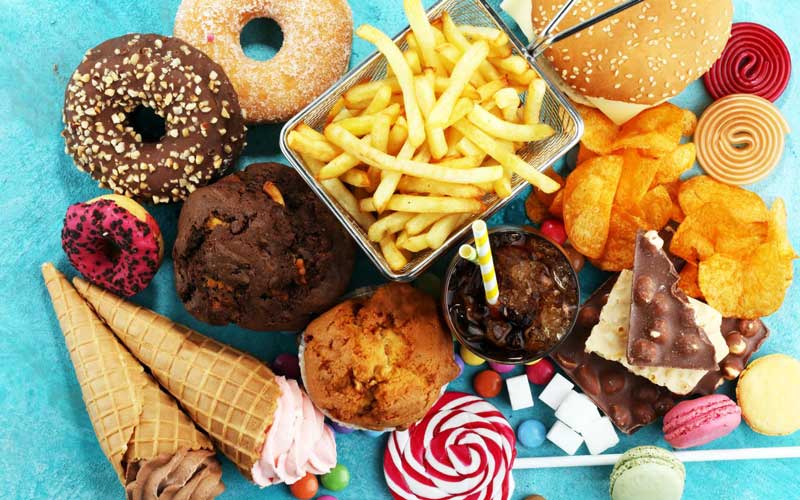It’s no secret that nutrition and sleep are essential to our health, but the relationship between them is often overlooked. For example, certain foods and drinks can make it harder to get a good night’s sleep, and diet and nutrition can affect the quality of your sleep.
Getting enough sleep is associated with maintaining healthier body weight and can be incredibly beneficial for those who are trying to lose weight. In order to eat smarter, sleep better, and live a healthier life, it’s important to understand the connections between the three. That’s what we are going to try and help you with today. By the end of this guide, we’ll try to explain:
How does nutrition affect sleep?

You are what you eat is a cliche, but it shows the fact that nutrition serves as a basis for health, providing the energy we need and other inputs that make the body function properly. Unfortunately, many people are unaware that their diet can affect sleep, even though the links between nutrition and obesity, diabetes, and heart health are well-known.
A balanced diet consisting of a variety of vegetables and fruits is able to provide the recommended daily intake of vitamins and minerals, as well as contribute to better sleep while promoting a healthy weight.
Because both sleep and nutrition involve multiple interdependent systems of the body, it is difficult to conduct research studies that clearly show a single diet that is best for sleep. Almost all bodily systems and processes can be aided by a high intake of vitamins and minerals, which is the central role of nutrition. There is growing evidence that sleep depends on sufficient nutrient consumption.
A large study found that a lack of calcium, magnesium, and vitamins A, C, D, E, and K was associated with sleep problems. The research doesn’t prove cause-and-effect, but it does support the idea that diet affects sleep.
The energy level and sleep quality of a person can be affected by high-carbohydrate meals. It’s well known that high-carbohydrate meals can make you sleepy, and they can also impair your sleep quality. Truth be told, a high carbohydrate intake has been shown to increase the number of awakenings at night and reduce the time of deep sleep you get every night. In addition, poor sleep quality is often associated with the frequent consumption of energy drinks and sweetened beverages.
Different types of diets offer this kind of nutritional balance, and some have been evaluated closely for how they affect your sleep.
How to improve sleep and nutrition?

If you want to improve your sleep and nutrition, it’s a good idea to talk with your doctor. A professional can help you identify your sleep problems and recommend a nutrition plan that works best for you. Most people can improve their bedroom environment and sleep hygiene to get better sleep. Making consistent sleep part of your everyday routine is an important factor in sleep hygiene.
Keeping a regular sleep schedule is one of the main components of sleep hygiene, and it can keep you from going to bed later. A late sleep schedule is associated with a higher risk of weight gain, making it a potential benefit for both sleep and nutrition.
It’s important to give yourself plenty of time to relax and get ready for sleep. This includes avoiding foods and drinks that can make it difficult to sleep. Since different beverages can negatively impact your quality sleep, we created a guide with the ‘Best drinks before bed’ you can check out. Generally speaking, eating too late at night can throw off your sleep schedule, and it can be even worse for people who are trying to lose weight.
Ensuring that your bedroom is dark and quiet, avoiding screen time for an hour or more before bed, having a comfortable mattress and bedding, and trying to get daylight exposure every day are some of the sleep essentials you’ll have to consider.
What happens when you eat right before bed?

You could end up tossing and turning all night if you eat just before you go to sleep, and let’s be honest, no one wants that.
Dr Aris Iatridis, a Pulmonologist in Austell, GA, says that ‘It’s best to avoid eating heavy meals at night’ and if you really want a big meal, do it for lunch. You’re less likely to store the extra calories as fat if you have time to burn them off. Thus have meals should be consumed in earlier hours of the day.
He explains that lying flat makes heartburn worse because there is no gravity to keep your stomach acid down. If you have trouble sleeping at night, talk to your doctor about lifestyle modifications or medication.
Which foods and drinks are most likely to disrupt sleep?

As we’ve mentioned above, food and drinks can both have a negative impact on your rest. That’s why if you want to get a good night’s sleep, you should avoid the following:
- First and foremost, don’t consume acidic foods before bedtime. Even healthy foods such as onions, tomatoes, garlic, citrus fruits and dark chocolate can cause reflux, which can make it harder to fall asleep and stay that way.
- Many people think that alcohol can help you fall asleep faster, which is incorrect. Alcohol can be harmful and lead to sleep deprivation.
- Caffeinated beverages can also be an issue of consumption in the late afternoon or in the evening. There are food and drinks that contain caffeine, such as chocolate, coffee or chocolate-flavoured desserts, soda and even decaffeinated coffee.
- Another thing to avoid is high-fat foods. What we mean by that are products that include butter, cheese, fatty cuts of meat and anything fried.
- Last but not least spicy meals and condiments should also be avoided at night. These include fiery dishes and sauces, which are associated with a risk of heartburn.
Does an unhealthy diet affect sleep disorders?

Some sleeping problems are directly linked to sleep disorders, and improper food intake can be the cause. One of the most serious sleep disorders is obstructive sleep apnea (OSA), which can cause impaired breathing and many nighttime wakings. In general, obesity is a key risk factor for sleep apnea, which means that an unhealthy diet might contribute to excess body weight.
Alcohol is known to worsen this sleep disorder as it further impairs airway muscle tone throughout the night. This leads to more obstruction of the airway during sleep, which can lead to constant waking.
Bottom line
Maintaining a healthy weight and eating a well-balanced diet can help you get better sleep. Being overweight can lead to sleep problems like snoring and sleep apnea.
There is no question that sleep and nutrition are related. Poor sleep affects hormones that are critical to appetite and fat storage. Therefore, it is recommended that you get at least 8 hours of sleep per night and find a balance in your macro and micronutrient intake.
Now it’s our turn to hear from you if any questions regarding the subject were left unanswered. If you want to share some information, we would gladly hear about it in the comments below.

